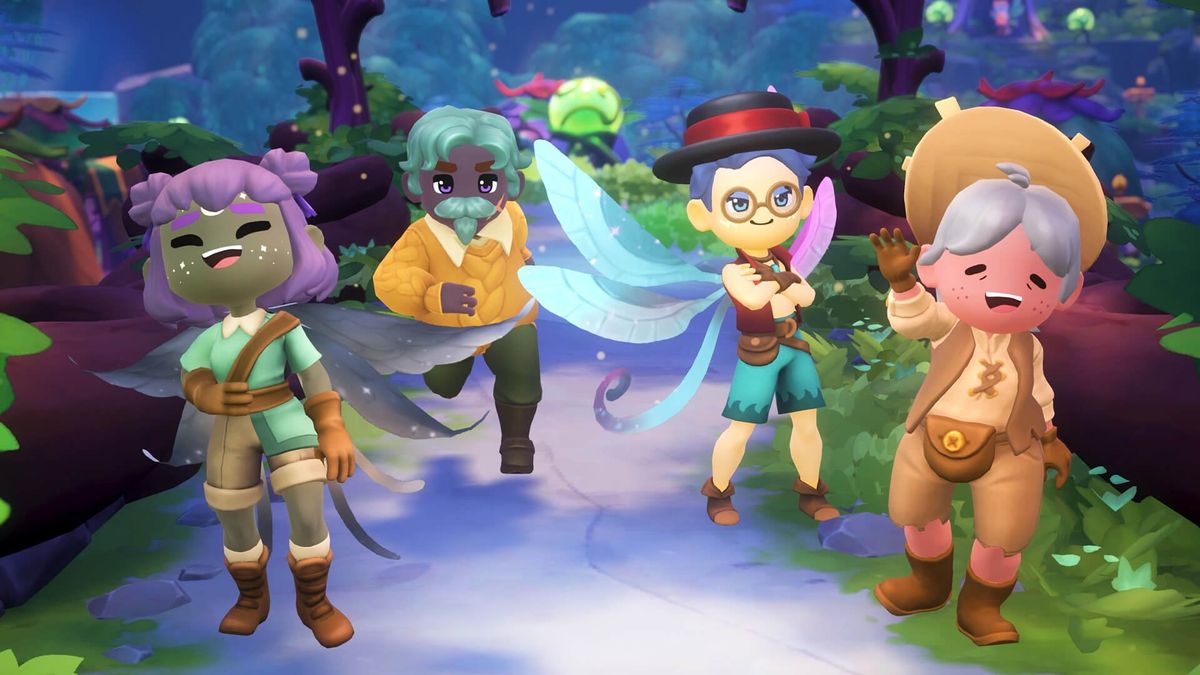The farming simulator genre as a whole has seen a balloon-like effect since the glory of Harvest Moon back on the Super Nintendo. With more recent outings like Stardew Valley, Slime Rancher, or the morbidly fun Graveyard Keeper, we have seen a massive evolution of the genre. That where the genre thrives is ingenuity and uniqueness. There has been a slew of cozy farm sims that have just fallen to the wayside trying to be just that, a cozy farm sim. But, luckily lately, we have had a cascade of these games come out that have something to say. Fae Farm is just that.
The characters in Fae Farm are what first brought it to my attention. While there are playersexual characters, these are characters that you can build relationships with no matter your gender, and there is a deeper level of inclusion here. You can pick your pronouns, including they/them, androgynous voices, hairstyles, and clothing, no matter your body type. While the actual character creator is not incredibly robust here, they do so much in the way of accessibility in their limited options that make it particularly welcoming no matter who you are.
The story is not a reason to come to a farming simulator. At least, in my experience, it's something to play between games—an escape from the anxiety-driven experiences that capture every minute of our day-to-day gaming. But from the introduction, Fae Farm held my attention like no other farming sim before it. I'm sorry, Stardew Valley, but this is my new baby. Fae Farm sees the player character coming to the island of Azoria and building up its community and its own farm. There is a promise of story progression here that ultimately let me down a bit. As you complete objectives for your fellow townsfolk, it will help you unlock newer tools and expand the island itself as you can very quickly, for example, start clearing the vines blocking off progression.
This would be an excellent way to have the story told, and I do love the residents of Azoria in Fae Farm, but eventually, the fetch quest stylings of the majority of its progressions started to tire me out. Thankfully, it is backed by some of my favorite gameplay loops of building a farm. The absolute freedom on the island is outstanding. Knowing I could easily traverse the land by any means necessary helped with the overall momentum. Unlike in other farming sims, where you have to walk around bushes and cliffs, in Fae Farm, generally, you can jump off cliffs, swing around, and just use whatever means you have available to get around. All without having to worry about stamina or fall damage.

That being said, what would a farming simulator be without its stamina gauge? Fae Farm has one that is pretty easy to follow and keep track of. As you move around, use tools, and fight, you will deplete your stamina gauge, and eventually, when it runs out, or your in-game clock hits midnight, you will simply fall asleep. The more significant change that Fae Farm attempts to fantastic success is its approach to a more relaxed experience. When you pass out in other farming simulators, you generally lose either some accrued money, items— or a mix of both. In Fae Farm, you lose nothing, a truly relaxing experience.
The same can be said for combat. While there is a bit of a steeper learning curve, having to memorize attack patterns of enemies, the trial and error of learning are completely wasted away by the fact that you just won't lose your items. It makes those late-night deep dives easier to take if you know no matter what, you are coming away with everything intact.

Tools and farming are very simplified in Fae Farm. You have to gather the correct materials to build a soil bed, bring out your seeds, and water it. Pretty simple. But it's when you start to level up your farming and crafting skills that things really evolve. Because under every mechanic in the game, there is a leveling system that lets you unlock new skills and become overall better at using specific skills. This means that if you want to spend your Fae Farm life farming crops, just focus on it, but I highly suggest completing chapter four to unlock a magical skill that changes the game. My one critique of the building and crafting is that it is not immediately apparent where to get some of the materials and I had to call in an assist from a fellow writer who was further along in the game.
Overall, Fae Farm is delightful. It doesn't have the most substantial story, but it has solid gameplay loops and really wears its inclusivity on its sleeve.


































































































































